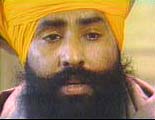Talwinder Singh Parmar
| Talwinder Singh Parmar | |
|---|---|

Talwinder Singh Parmar
|
|
| Nickname(s) | Talwinder Singh Babar |
| Born | February 26, 1944 Panchhat, Kapurthala, Punjab, India |
| Died | October 15, 1992 (aged 48) Kang Arian, Phillaur, Punjab, India |
| Allegiance | Babbar Khalsa International |
| Years of service | 1979 - 1992 |
| Rank | Founder of Babar Khalsa |
| Battles/wars | Khalistan movement |
Talwinder Singh Parmar (February 26, 1944 – October 15, 1992) was born in Panshta (Panchhat), Kapurthala, Punjab, India. He belonged to the Sikh Rajput community.
Parmar carried out fighting from outside India founding the Babbar Khalsa International (BKI) in Vancouver, Canada in 1979. Parmar was the overall chief of Babbar Khalsa whereas Sukhdev Singh Babar was only the Chief of India. Parmar later became a naturalized Canadian citizen. The Commission of Inquiry into the Investigation of the Bombing of Air India Flight 182 concluded that Talwinder Singh Parmar, although never convicted, was the leader of the conspiracy to bomb Air India flights in 1985. He was killed in a police encounter with Punjab Police on October 15, 1992; details of this incident are disputed.
In July 2007, the investigative magazine Tehelka reported that Parmar may have confessed to the Punjab police during interrogations preceding his death. He is said to have supplied the dynamite to Lakhbir Singh Rode, a nephew of Jarnail Singh Bhindranwale, who was claimed to have been the mastermind behind the bombing of Air India Flight 182.
On November 19, 1981 the Punjab Police was looking for Bhai Tarsem Singh Kalasinghian and his accomplices, when on the morning of November 19, 1981 an encounter took place at Daheru village in Ludhiana district in which Police Inspector Pritam Singh Bajwa and Constable Surat Singh of Jalandhar were gunned down. All of the militants hiding in a house of Amarjit Singh Nihang managed to escape. Among those named in the FIR were Wadhawa Singh (present chief of Babbar Khalsa now based in Pakistan), Talwinder Singh Parmar, Amarjit Singh Nihang, Amarjit Singh (Head Constable), Sewa Singh (Head Constable) and Gurnam Singh (Head Constable). This is believed to be the first act which gained Babar Khalsa and its chief Talwinder Singh Parmar notoriety. In 1982, India issued a warrant for Parmar's arrest for six charges of murder, stemming from the killing of police officers. Canada declined to extradiate Parmar to India.
...
Wikipedia
